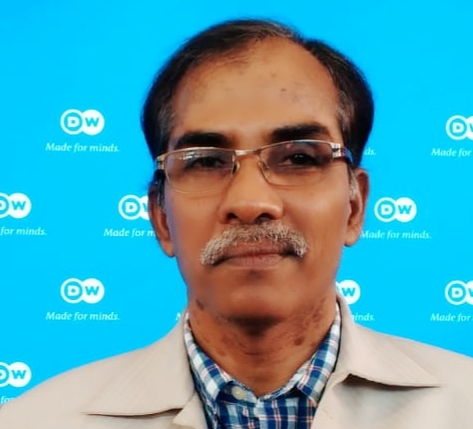A Conversation with our new Chair of the Board Uday Basu
A conversation between former Board Chair Douglas Todd and new Board Chair Uday Basu:
Q:
Tell us a bit about yourself.
A:

I have been in this profession for four decades. I began at The Statesman, a leading English daily of India established by a British journalist, Robert Knight, in the latter half of the 19th century. I started as a junior reporter in 1979. Since then I served the paper in different capacities, writing thousands of articles, news reports, analyses on diverse subjects, including religion and politics. I virtually ran the paper as its Coordinating Editor, the No 2 position after the Editor, for several years till I retired in August 2020. Now I write editorials for another important newspaper in eastern India, Orissa Post.
Q:
Why did you choose religion as a focus of your journalism?
A:
India, the land I hail from, is a mosaic of religious faiths and practices. Though the majority of the population belong to Hinduism, people of different faiths—Islam, Christianity, Buddhism, Jainism, Sikhism etc—have richly contributed to the growth of a composite religious-cultural heritage of the country. My school—Hindu School, Kolkata—taught me the best of Hinduism, the essence of which is contained in the concept of tyaktena bhunjitha meaning getting nourishments through renunciation.
My college—St. Xavier’s College—taught me the best of European culture, comprising the Greek goal of sweetness and light and Jesus’ gospel of love. A great savant of India, Sri Ramakrishna Parmahansa, captured the true spirit of religion in his dictum: There are as many ways (to divinity) as schools of thought.
My mind has been shaped by all these influences, propelling me to choose religion as a focus of journalism.
Q:
What are some of the major religious issues in your country today?
A:
In my country the Hindu-Muslim divide is the most burning issue. It encompasses almost every aspect of life. Religious tolerance is the foundation of post-independence, democratic India. But, since the right-wing BJP captured the central government in 2014 an all-pervasive hate-campaign has been launched by the ruling party in the name of pseudo-Hinduism. Muslims are being victimized by the followers of this political party with its affiliate organizations. A veneer of religion is being used to capture political power. This is a legacy of the British colonial policy of divide and rule.
Q:
Please tell us about some reporting of which you are proud.
A:
I will only recount the most exciting one, for space constraints. I went to cover a riot that broke out between Hindus and Muslims in a semi-rural area of Bengal. Seventeen Muslims fell to police bullets. When I visited those mud-huts I saw gaping holes on the walls bearing mute witness to the firing. The trouble was over a Tazia procession taken out by the Muslims in the area. When they were passing along a Hindu-dominated area they had to cut off the branch of a tree so that the procession could move on. This sparked the riot. When I went to interview the Muslims after having talked to the Hindus, I was mobbed by a hostile group who asked me why I had gone to the Hindus first. I retained my cool and said it was because one had to go past the Hindu area first before reaching the Muslim houses. I asked them to give me a glass of water. They were stunned and they hesitated because many Hindus in villages are allergic to accepting drinking water from Muslims. In a mock rage I admonished them for finding religion even in water and drank water from their glass. That melted their hearts and I gained a wealth of information from both the Hindus and the Muslims.
Q:
Have you faced hostility while reporting about religion?
A:
Fortunately, the paper I worked for commands such respect that neither political parties nor religious outfits ever dared to try to muzzle my voice. I continue to write my editorials with the same freedom.
Q:
Do you think religion is increasingly occupying the center stage of human affairs across the globe?
A:
Yes, I think so. This is because political parties use religion as a tool to capture power, as religions are the biggest constituencies. By manipulating religious faiths, corrupt, power-hungry politicians can also divert the issues of bread and butter to religious fanaticism and thereby escape accountability.
Q:
How do you think journalists can help in resolving religious conflicts?
A:
Journalists can play a catalytic role in this effort. They can present unvarnished truths by being objective, neutral and shunning religious prejudices.
